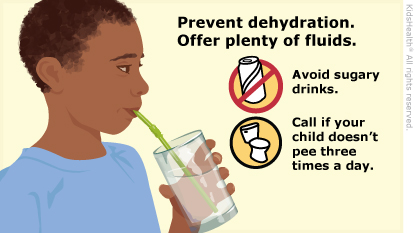Dehydration: How to Care for Your Child
Dehydration is when there is not enough water in the body. In children, it is often caused by vomiting, diarrhea, or both.
Your child stayed in the hospital to get fluids through an intravenous (IV) line or a nasogastric tube (a thin flexible tube that goes into the nose and down to the stomach). Now your child is feeling better and is ready to go home. Follow these instructions to make sure your child gets enough fluids at home.


Offer your child plenty of fluids. Follow the health care provider's instructions on what your child should drink.
Your health care provider may recommend oral rehydration solution (such as Pedialyte®, Enfalyte®, or a store brand). It has the right amounts of water, sugar, and salt to help with dehydration. You can offer it to older kids in a regular cup. For younger children, or for kids who are having trouble drinking enough, it may be helpful to use a small cup, spoon, or syringe to offer 1–2 teaspoons (5–10 mL) every few minutes. You also can offer electrolyte ice pops.
You can give less and then stop the oral rehydration solution as your child starts to drink and eat more.
You will know that your child is staying hydrated (getting enough fluid) if he or she:
Reminders:
-
You can buy oral rehydration solution at a drugstore or supermarket without a prescription. If you can't get oral rehydration solution, talk to your health care provider. There are other fluids that you can give to help your child.
-
Don't give sports drinks, soda, or full-strength (undiluted) juice. They have too much sugar and can make some symptoms worse.
-
Follow the health care provider's recommendations for any diet changes.
-
It may take 3–4 days for your child's appetite to come back. As long as your child is drinking and peeing every 8 hours, it's OK if he or she is not eating solid foods.
-
Don't give medicines for diarrhea or vomiting unless your health care provider recommends it.

Your child:
-
won't take anything to drink for more than a few hours
-
is still not eating solid foods 3–4 days after the visit
-
vomits more than a few times in 24 hours
-
has vomit that's bright green, red, or brown
-
hasn't peed in 8 hours


How does dehydration happen? Dehydration in children usually is caused by vomiting and/or diarrhea. It also can happen when children don't want to drink because they have mouth sores or a sore throat. Kids also can get dehydrated in hot weather or if they exercise a lot.
How can I prevent dehydration? Whenever your child gets sick, give extra fluids or oral rehydration solution. Give small amounts often, especially if your child is vomiting.
It's important that kids drink often during hot weather. Those who play sports or who are very physically active should drink extra fluids beforehand, and then take regular drink breaks (about every 20 minutes) during the activity.
Is dehydration dangerous? Mild dehydration in healthy children usually isn't dangerous. But dehydration that gets more severe can cause the body to shut down and can even become life-threatening.